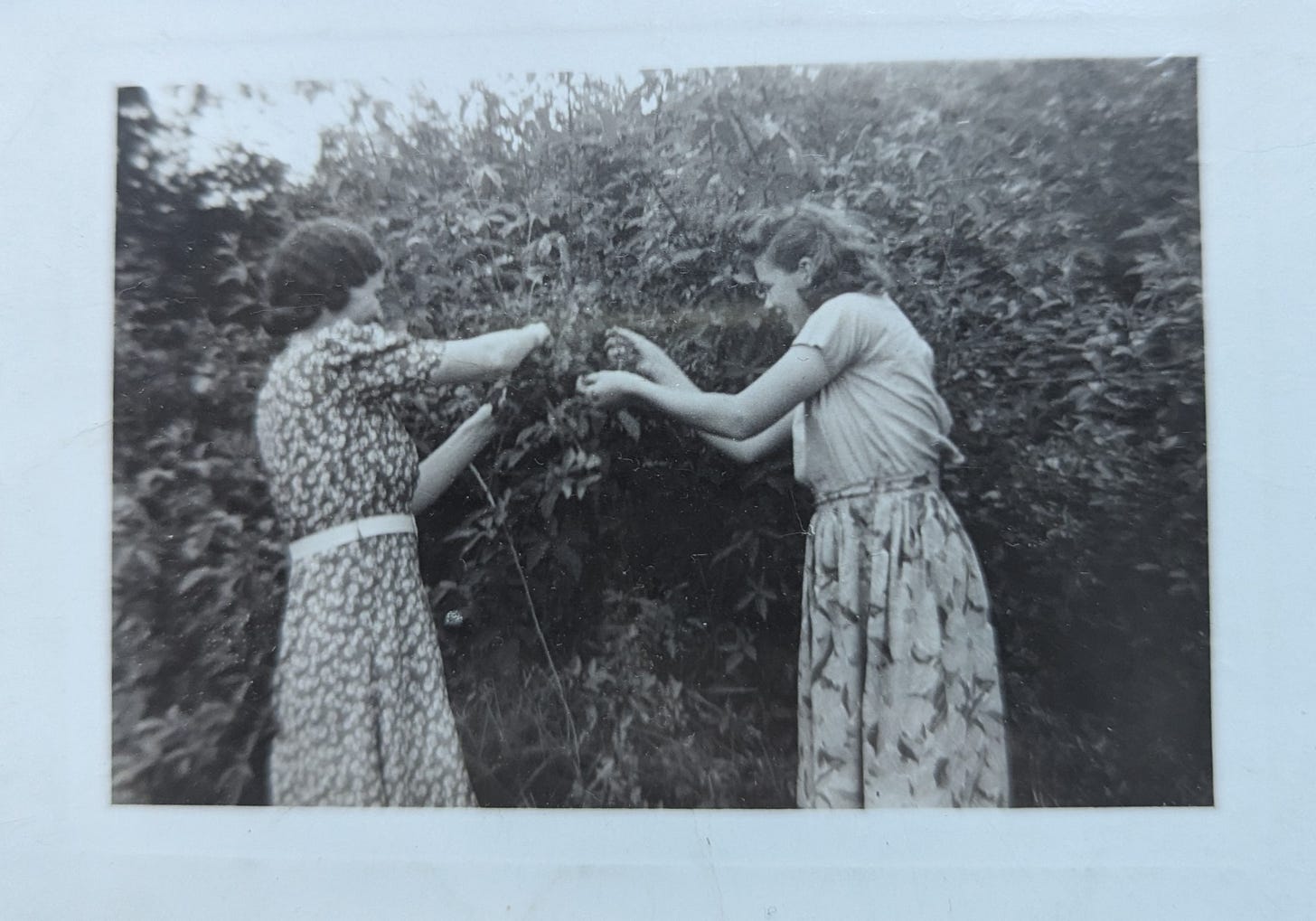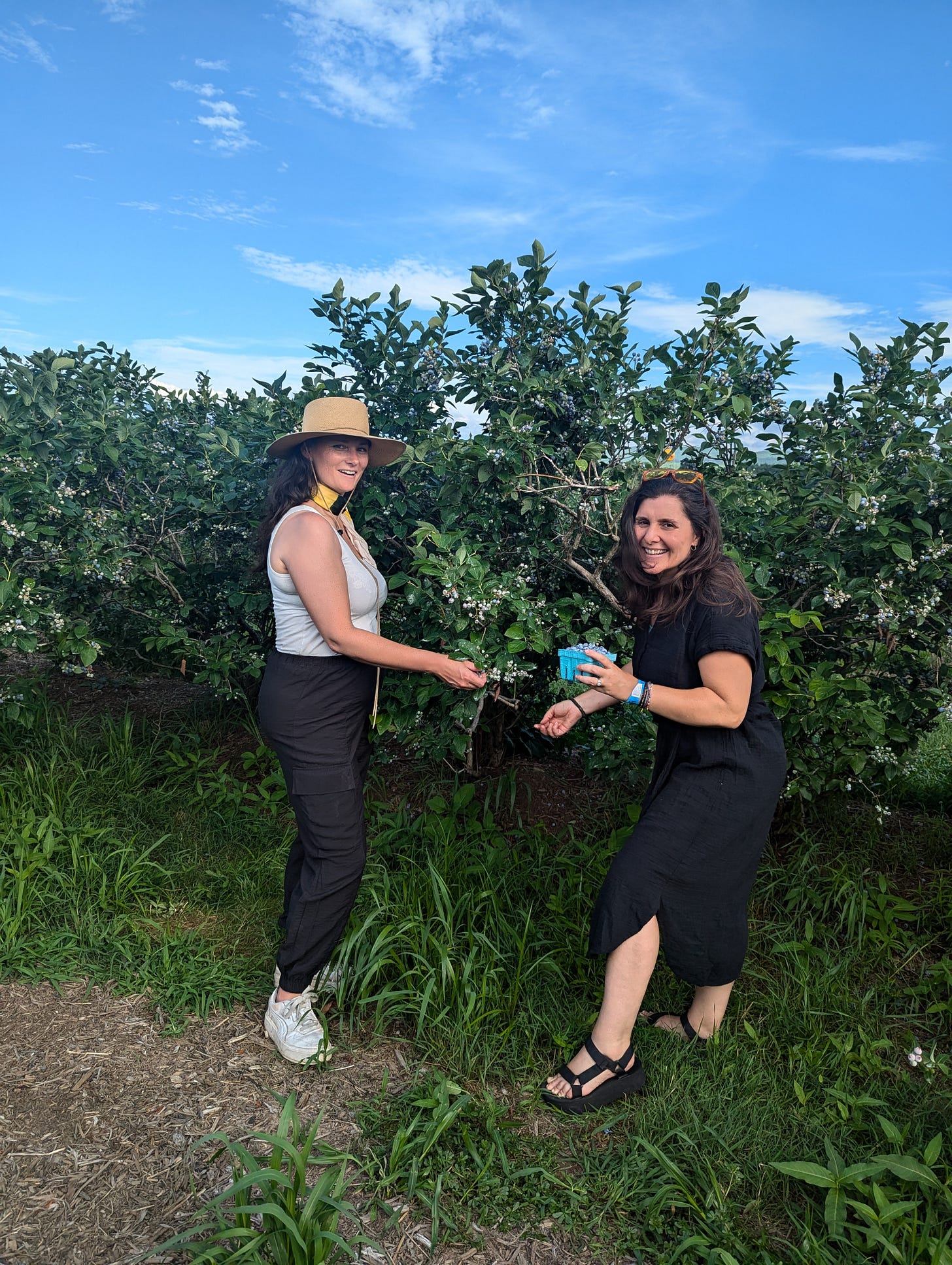Depth and Difference in Relationships between Women
On other mothers, female friendship, and the re-association of memory
I see this photo every morning while making my coffee, but I scarcely know the women in it. They are my dad’s biological mother, and the adoptive mom who raised him. They were already family, one the aunt and the other a young mother. I’m not sure when it was taken in the timeline of our family — was it before he was born, or after? If it was after, who was he living with at the time? Was it before things got too hard to name? In this photo they look pretty happy together, their arms joined in the shared, simple, delicious task of gathering summer blueberries.
The multitude of mothers was mostly replaced by their absence by the time I entered our family timeline. That’s not to say my mother wasn’t around — she was, between the hours of 3pm and 3am since she worked the early nursing shift and tried her damnedest to do good by me. But where were the other mothers? The aunt: sent away when her husband died and treated like she was too stupid to care for her growing child, a story that has only repeated itself in the next generation. The great-grandmother: institutionalized so long that her children were raised as orphans. The two paternal grandmothers: their memories hardly named.
Instead, I’m in a sea of sisters raised on patriarchal dust that demands our singular mothers be all-containing or else banishes them.
And what are we sisters wont to do amid this fear of banishment but hide from each other or try and prove our superiority? Can we still gather bounty together, arm in arm?
Here’s the thing about containment — well, two things: It’s natural to want it. And, it’s never free from difference.
Even in the womb, that place of total surround and embodiment by another, there is already difference. What attentive mother has not longed to feel those kicks, even if they push on her bladder or press between her ribs in stabbing pain? Counting kicks is the gestating mother’s way to monitor if there’s a life in there. Containment + difference = life.
Sometimes containment is so limited that only difference is felt. Patriarchy sees an opening, and rather than bring other mothers it pries open the difference until it becomes a chasm.
“Get rid of that woman!” it shouts. “She’s no good! Save yourself!”
I know plenty who have felt this need for extreme separation. I’ve been there myself. There are mothers who don’t accept their child’s sexuality; mothers who deny their child’s abuse or even act to cover it up; mothers who are too overcome with their own emotional distress that they can’t see the child in front of them.
Such a lack of containment sends parts of the self into hiding. Disavowed, fragmented, where are we to go but try and recover those parts eventually?
The short of it is, no mother can every fully contain us, just as no partner can and no friendship can. What any of us truly needs from containment is enough acceptance of our difference that we don’t have to send parts of ourselves into hiding. And if we can’t change that about our foremothers, we can change that now in our friendships.
I revisited the morning-coffee-multiple-grandmothers photo this summer when I was picking blueberries with a dear friend, and my mother snapped this shot of us. I’ve mostly been thinking about friendships between women since. How much do we rely on each other? How much do we expect another person to understand us fully? What happens when we disagree?
Adult friendships worth their salt are bound to have turbulence — and I think of this as kicking in the womb of our shared becoming.
As a wish for perfect containment may get transferred from our mothers, to ourselves as mothers, to our partners and friendships, there are several traps we can fall into. If a friend suddenly doesn’t understand something you’re experiencing, when they seemed to understand everything about you so well before, you might have some reactions~
Making yourself small so you fit inside the world of the other. Do you pretend to agree, when you really don’t?
Making yourself big so that you can fit the other inside your world. Do you push back, reinforcing your view of things? This could be an unintentional move toward superiority and hierarchy.
Avoiding or ending the relationship. Do you avoid conflict altogether or pull away from relationships that have been significant when difficulties come up? This could be based in an unconscious belief that you’re not supposed to have discord if you are close. (Of course, some relationships do need to be avoided if they persistently deny your reality)
There is another reaction you might have:
To accept the multitude of (m)others and friends who contain parts but not all of us, while being a synchronous part of that containment.
Surprisingly, divorce and the absence of a single partner gifted me with a multitude of deep friendships. Thankfully, many of these friends are also married, so I am free from the delusion that only single women have the luxury of a matrix of multiple fulfilling relationships! But it is interesting how patriarchy trickles into so many marriages and motherhoods with the idea of containment by one other person, when in actuality so much of the self is dissociated this way. The aftermath of all this is multiplicity. Not nesting dolls of one little person being contained by someone bigger, who is held by someone bigger yet. The warring in our world is a daily reminder that no one is big enough to contain all of it. But proper multiplicity and the collectivity of care.
Happenings:
Listen to my podcast interview on Reimagining Motherhood hosted by Chelsea Robinson. (It’s also available on Spotify!) We talk about matrescence as opportunity for transformation, maternal subjectivity, and feminine lineage.
My academic article Maternal Excess: Pathways Through Overwhelm to Transformation in the Perinatal Period was just published in Studies in Gender and Sexuality. There are a limited number of free e-prints available online or you can message me for a copy.
Everyone who participated in the first Writing the Maternal Body Weekend Retreat had such a wonderful time, I’ll be hosting another one in the Fall — save the date for October 18-20!
What I’m reading:
Uncovering the Act of Maternal Infanticide, by Brooke Laufer — Written by a Jungian forensic psychologist, Laufer gives a gracious peek into the destructive maternal instincts that modern societies have unsuccessfully tried to banish.
Betrayal Trauma, by Pamela Freyd — written by a psychologist with significant experience of betrayal in her family life, Freyd lays out how damaging the double trauma of betrayal can be. When a person is betrayed by someone they need to trust for their basic needs (a caregiver, a partner, a boss), they may prioritize the relationship and circumscribe memory of the betrayal until a later time when they are no longer dependent. Re-reading this in tandem with the next book has been a trip:
Liars, by Sarah Manguso — autofiction about the way stories are told to keep a marriage together, sometimes brutally fragmenting the self and keeping other versions of the story hidden.
As always, I’d love to hear what comes up for you when you’re reading this month’s stack, from betrayal to multiplicity and anywhere in between.
Until next time! XX Tracy





